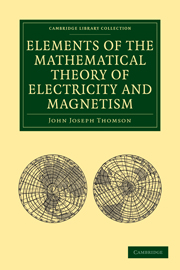Book contents
- Frontmatter
- PREFACE TO FIRST EDITION
- PREFACE TO THE SECOND EDITION
- PREFACE TO THE THIRD EDITION
- PREFACE TO THE FOURTH EDITION
- Contents
- CHAP. I General Principles of Electrostatics
- CHAP. II Lines of Force
- CHAP. III Capacity of Conductors. Condensers
- CHAP. IV Specific Inductive Capacity
- CHAP. V Electrical Images and Inversion
- CHAP. VI Magnetism
- CHAP. VII Terrestrial Magnetism
- CHAP. VIII Magnetic Induction
- CHAP. IX Electric Currents
- CHAP. X Magnetic Force due to Currents
- CHAP. XI Electromagnetic Induction
- CHAP. XII Electrical Units: Dimensions of Electrical Quantities
- CHAP. XIII Dielectric Currents and the Electromagnetic Theory of Light
- CHAP. XIV Thermoelectric Currents
- CHAP. XV The Properties of Moving Electric Charges
- INDEX
CHAP. IV - Specific Inductive Capacity
Published online by Cambridge University Press: 07 September 2010
- Frontmatter
- PREFACE TO FIRST EDITION
- PREFACE TO THE SECOND EDITION
- PREFACE TO THE THIRD EDITION
- PREFACE TO THE FOURTH EDITION
- Contents
- CHAP. I General Principles of Electrostatics
- CHAP. II Lines of Force
- CHAP. III Capacity of Conductors. Condensers
- CHAP. IV Specific Inductive Capacity
- CHAP. V Electrical Images and Inversion
- CHAP. VI Magnetism
- CHAP. VII Terrestrial Magnetism
- CHAP. VIII Magnetic Induction
- CHAP. IX Electric Currents
- CHAP. X Magnetic Force due to Currents
- CHAP. XI Electromagnetic Induction
- CHAP. XII Electrical Units: Dimensions of Electrical Quantities
- CHAP. XIII Dielectric Currents and the Electromagnetic Theory of Light
- CHAP. XIV Thermoelectric Currents
- CHAP. XV The Properties of Moving Electric Charges
- INDEX
Summary
68. Specific Inductive Capacity. Faraday found that the charge in a condenser between whose surfaces a constant difference of potential was maintained depended upon the nature of the dielectric between the surfaces, the charge being greater when the interval between the surfaces was filled with glass or sulphur than when it was filled with air.
Thus the ‘capacity’ of a condenser (see Art. 51) depends upon the dielectric between the plates. Faraday's original experiment by which this result was established was as follows: he took two equal and similar condensers, A and B, of the kind shown in Fig. 39, made of concentric spheres; in one of these, B, there was an opening by which melted wax or sulphur could be run into the interval between the spheres. The insides of these condensers were connected together, as were also the outsides, so that the potential difference between the plates of the condenser was the same for A as for B. When air was the dielectric between the spheres Faraday found, as might have been expected from the equality of the condensers, that any charge given to the condensers was equally distributed between A and B. When however the interval in B was filled with sulphur and the condensers again charged he found that the charge in B was three or four times that in A, proving that the capacity of B had been increased three or four times by the substitution of sulphur for air.
Information
- Type
- Chapter
- Information
- Elements of the Mathematical Theory of Electricity and Magnetism , pp. 120 - 144Publisher: Cambridge University PressPrint publication year: 2009First published in: 1895
